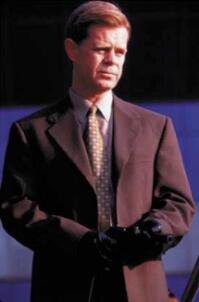Panic
reviewed by Dave heaton
The opening shot of Panic places it in the realm of film noir: A man with a serious face is standing in the shadow of a wall. He lights a cigarette and slowly walks away into an empty courtyard, a man alone. The man, Alex (William H. Macy), is a hitman, but this isn't really film noir, or at least it doesn't follow the plot conventions of that genre. Panic, written and directed by Henry Bromell, is family drama, suspense and black comedy combined. Yet like the classic films of that style, it is a portrait of a man's interior journey. Alex is a lonely man at a crossroads. His first line in the film is "Do you ever get the feeling you're dead?", and he walks through life as if he believes he is.
 The idiom that the sins of the fathers will haunt their children comes up in many discussions of another film featuring Macy, Magnolia, yet here it is perhaps more apt, as the central theme of Panic is the effect parents have on their children. It's a story about what parents pass on to their children. In many ways, it deals with the struggles of an average family running a family business, yet in this case, the business is that of a hitman. Donald Sutherland plays Alex's father Michael, who started the business with help from his wife Deidre (Barbara Bain). Through a series of scary flashbacks, we see the ways that Michael taught his son how to be a hitman, beginning with a lesson in gunmanship.
The idiom that the sins of the fathers will haunt their children comes up in many discussions of another film featuring Macy, Magnolia, yet here it is perhaps more apt, as the central theme of Panic is the effect parents have on their children. It's a story about what parents pass on to their children. In many ways, it deals with the struggles of an average family running a family business, yet in this case, the business is that of a hitman. Donald Sutherland plays Alex's father Michael, who started the business with help from his wife Deidre (Barbara Bain). Through a series of scary flashbacks, we see the ways that Michael taught his son how to be a hitman, beginning with a lesson in gunmanship.
In the present time of the film, Alex is a middle-aged suburban man, married with a son. On the surface he's a regular guy who works in the mail-order business, but in reality he's also a hitman, a fact only known by his parents. His mid-life crisis is to begin questioning the family business for the first time in his life, to wonder why he's killing people for a living. He's increasingly shutting himself off from his wife Martha, played convincingly by Tracey Ullman, and going through life in a sullen daze. While Alex's parents react to his revelation that he's thinking of quitting with the "of course you're not, you're just going through a phase" matter-of-factness delivered by many a parent who hasn't taken the time to truly understand their child ("Why? Because you are my only son, and I'm not going to let you through your life away"), Alex finds a more accepting ear through visits to a therapist, played by John Ritter, to whom Alex reveals his occupation ("I kill people") and the misgivings he feels about it. In the reception area at the therapist's office, he also flirts with Sarah (Neve Campbell), a wild twentysomething girl who represents to Alex a possible escape from his doldrums.
Alex's response to his therapist's opening question concerning what he does for a living--"I work for my father"--tells much about the reasons behind Alex agreeing to kill people for so many years. As the film's plot unfolds, it becomes clearer that the story is less about Alex's job as a hitman than it is about what kids teach their children, and how potentially dangerous those lessons can be. Alex's bed-time conversations with his son Sammy (David Dorfman), where the boy asks his father questions about God, infinity and death, are contrasted sharply with the way Michael deals with everyone, especially Alex. Sutherland's Michael is both a typical macho man, guzzling beer, watching TV and bowling, and a subtle controlling force over everyone around him. The interactions between Sammy and his grandpa are among the most powerful in the film, as an innocent, inquisitive child deals with the power-hungry patriarch. In one scene, Micahel gets angry at Sammy for not following orders while they put together a model airplane together. As Michael yells at Sammy and Maddy gets angry with him for yelling at her son, Alex gazes out the window with a stare that reveals understanding, fear and a lifetime's worth of sorrowful memories.
Panic tells a simple story, but one with universal implications. The movie's advertising tagline, "A Story of Family, Lust, Murder…and Other Midlife Crises," tells you next to nothing about the film, especially compared with how much is revealed in a single shot of William H. Macy's silently expression-filled face, or in a simple line of dialogue. The panic in the film's title is the horror that Alex feels when he realizes what he has let happen by not standing up to his father, and what will continue to happen if he doesn't act now, but it is also the panic instilled in the viewers when they realize that this story, as far-fetched as it seems on the surface, is a universal one, that these small cycles of dominance are quietly going on around us every day.
Copyright (c) 2005 erasing clouds |
|